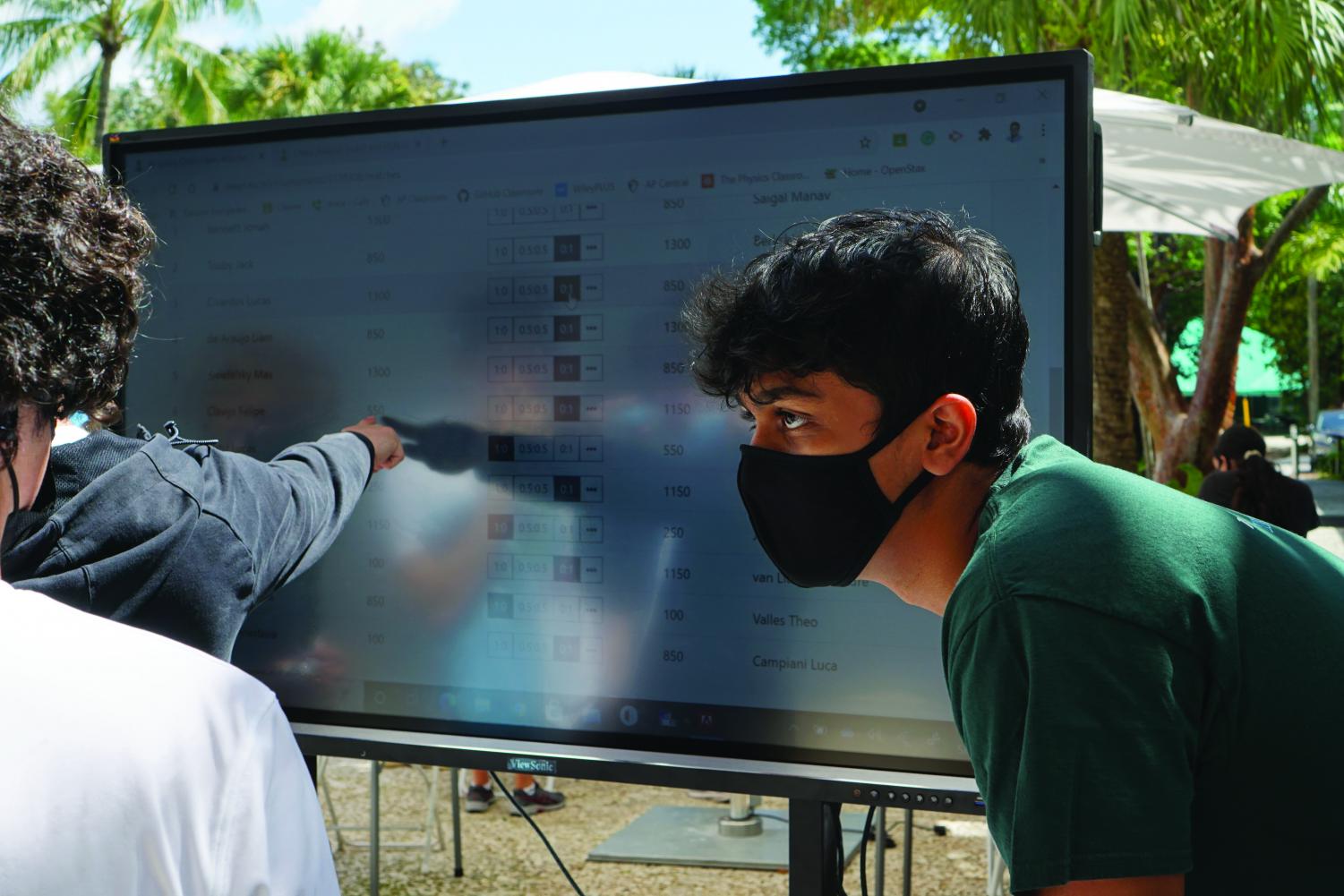Dina Kaplan '22 is a staff writer for The Catalyst. She covers local news for the newspaper.

Gabriel Mora '22 is a Co-Editor in Chief and writer for The Catalyst. He covers news & multimedia content for the newspaper.


The story behind the RE senior's rise to International Master
December 13, 2021
While many seventh graders were on their way to practice when the bell rang at the end of a school day on November 1, 2016, Nikhil Kumar ’22 was swarmed by TV reporters desperate to interview the new international champion. Kumar had just arrived back in Miami after winning the World Cadets Chess Championship in Batumi, Georgia (the country), where he, the undisputable underdog, had defeated Rameshbabu Praggnanandhaa of India (the number one player) and Andrew Hong (the number-one ranked player under age 12 in the US).
As reporters from WPLG Channel 10, WSVN Channel 7, and WTVJ Channel 6 filled the halls of Ransom Everglades Middle School, Kumar felt humbled yet a bit uncomfortable. “[It was] quite awkward, honestly. In middle school, as I am now, I was very shy and didn’t want very much attention, so being recognized and congratulated by people I didn’t even know was awkward for me,” he said.
Yet this attention marked only the beginning of Kumar’s rise to chess stardom, which has continued into his high school years. This past summer, Nikhil accomplished his goal of becoming an International Chess Master, a prestigious title given to players who have reached an established rating of 2400, which is acquired by only about 3,800 of the millions of chess players worldwide. Kumar’s chess training has entailed many hours of practicing, intense strategizing, and countless practice matches.
Kumar began playing chess at around ten years old, but it was “6th or 7th grade, [when I] won a couple [of] state tournaments,” that he “started stepping up the task of practicing and training.” On the heels of winning the world championship, Kumar started playing in international tournaments more often, pushing him down a unique path towards chess success: his “middle school gap year.”
Though gap years between high school and college have become much more common in recent years, a gap year in the eighth grade seemed unheard of. But Kumar saw it as his chance to break into a higher level of play. “Once I finished that tournament, I realized that I had a chance to be really good, and I also was the youngest in my grade at that point, so I took the gap year from there.”
Along with Kumar’s gap year came a completely changed tournament regimen. He spent two to three hours a day practicing for upcoming tournaments that would occur two to three times a month. For tournaments in the US, he would take flights out of MIA on Friday night only to return less than 48 hours later.
Kumar laid out what a typical tournament day would look like. “Usually in the US, it is two games. So, it would be maybe noon and six, and then each game is three to four hours. Then we take a break, and I have to eat, prepare, and maybe sleep. In Europe, though, it’s one game per day. So, it is a lot slower, and is usually a 10-to-11-day tournament. But usually, it’s pretty hectic in the US,” he said.
Joining the class of ’22 after his gap year was somewhat challenging for Kumar. “Most of my friends were in the grade above; the social part was kind of hard. But, when it comes to academics, I was probably fine. I mean, I didn’t really forget much,” he said.
Kumar has maintained strong grades throughout high school and gotten involved in many other activities: he is a HIP Peer Health Educator and board member, Science NHS Physics Coordinator, Math Team Calculus Coach, member of Cum Laude Society and President of the Chess Team. He acknowledged that when the workload increased, he had to cut back on his training. But this still meant practicing rigorously for one to two hours a day.
Kumar approaches chess as any successful athlete approaches a sport; he adheres to a regimented practice schedule, fine-tuning his skills and decisive calculations. Kumar’s brother Naman Kumar ’25 revealed that Kumar treats every practice game like a tournament. The intensity of his training sessions requires silence and cooperation from the whole family.
“Normally, when Nikhil is working on chess by himself, he is either reading books and playing moves on the board or playing practice games online. It is important to not make noise when he is studying, and especially when he is playing games,” Naman said. “No one goes around him because we don’t want to disturb him, and there is not much action in the house at the time.”
Kumar’s achievements have left many both in the RE community and around the world wondering what precisely makes him so talented at his sport. Chess team faculty sponsor and physics teacher Mr. Luis Felipe revealed that, similar to “professional athletes like Michael Jordan and Messi,” Nikhil’s keen ability to pinpoint an activity that he could excel in while others were still evaluating their options has made him elite. He added that Kumar’s accomplishments are due to “a combination of raw talent with hard work and sacrifice.”
Chess team member Ryan Berkshire ’23 described that he joined the chess team in part because he wanted to be guided by “strong players like Nikhil,” adding that he “[respects] Nikhil very much. He does teach us often, and I try to get as much out of that as I can to learn the way he plays.”
According to Mr. Felipe, one of the goals of the chess team has been to “create a space for Nikhil to train and help people … to use him as a teacher for them, giving them the experience, and teaching the other players. What we do is use his experience and quality in teaching the other students.”
Kumar looks forward to continuing chess in college, but he does not intend to compete professionally. “Even though I enjoy chess, I don’t necessarily want it to control every part of my life. Playing professionally requires full dedication and time to chess,” he said.
Even so, he acknowledged that chess has shaped his character both intellectually and personally. “Academically,” he said, “it lets me focus better because having to sit and focus for so long helps me focus on tests or whatever it is. And then, when it comes to my personal mentality, I would say that it gave me a different group of friends that I have made at tournaments. A lot of people do come up to me asking me about chess, which gives me confidence and makes me feel better. But most of it is just the general environment of going to play and meeting people. That, in and of itself, is good.”
Dina Kaplan '22 is a staff writer for The Catalyst. She covers local news for the newspaper.

Gabriel Mora '22 is a Co-Editor in Chief and writer for The Catalyst. He covers news & multimedia content for the newspaper.